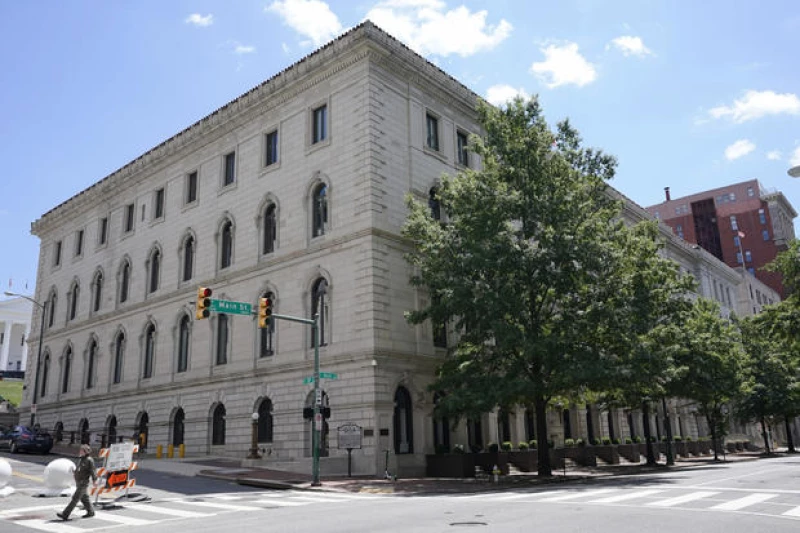A federal appeals court on Tuesday overturned the West Virginia law banning transgender girls from playing on girls' sports teams, finding that it violates Title IX, the federal civil rights law that prohibits sex-based discrimination in schools. The ruling comes amid a wave of anti-trans legislation cropping up across the country, as well as efforts to fight back against it.
The ban in West Virginia was originally signed into law by Gov. Jim Justice in 2021, and introduced as the "Save Women's Sports Act." It required that any official or unofficial school-sanctioned event involving athletics determine each athlete's participation in the event "based on the athlete's biological sex as indicated on the athlete's original birth certificate issued at the time of birth," effectively barring transgender students from participating.
The ruling from the 4th U.S. Circuit Court of Appeals said the law cannot lawfully be applied to a 13-year-old girl who has been taking puberty-blocking medication and publicly identified as a girl since she was in the third grade.
In February 2023, the court blocked the state's bid to kick Becky Pepper Jackson off of her middle school track and field team if the law were enforced.
Judge Toby Heytens wrote that offering her a "choice" between not participating in sports and participating only on boys teams "is no real choice at all."
"The defendants cannot expect that B.P.J. will countermand her social transition, her medical treatment, and all the work she has done with her schools, teachers, and coaches for nearly half her life by introducing herself to teammates, coaches, and even opponents as a boy," Heytens wrote.
The court Tuesday ruled in favor of the American Civil Liberties Union, its West Virginia chapter and LGBTQ interest group Lambda Legal, which filed a lawsuit in 2021 against the state and county boards of education and their superintendents as defendants. Republican Gov. Jim Justice had signed a bill into law earlier that year.
"This is a tremendous victory for our client, transgender West Virginians, and the freedom of all youth to play as who they are," ACLU West Virginia attorney Joshua Block said in a statement. "It also continues a string of federal courts ruling against bans on the participation of transgender athletes and in favor of their equal participation as the gender they know themselves to be. This case is fundamentally about the equality of transgender youth in our schools and our communities and we're thankful the Fourth Circuit agreed."
Title IX Violation Found in West Virginia Transgender Athlete Case
The court ruling in West Virginia found that the application of a state law violated Title IX when enforced against a transgender girl. The court highlighted that the girl has been openly living as a girl for over five years, legally changed her name, and holds a female gender marker on her birth certificate issued by the state of West Virginia. Additionally, the court noted that she undergoes puberty blocking treatment and estrogen hormone therapy, and has exclusively participated in girls' sports teams since elementary school.

Attorney General Patrick Morrisey expressed deep disappointment with the court's decision, emphasizing his commitment to upholding Title IX and safeguarding women's sports. He reiterated the importance of maintaining fairness and safety for female athletes and vowed to defend the existing law using all available means.
The case reflects the ongoing legal and legislative battles surrounding transgender individuals' participation in public life in the United States. Many states with Republican majorities have enacted laws restricting transgender participation in sports and prohibiting gender-affirming healthcare for minors. Furthermore, some states have imposed limitations on restroom and locker room access for transgender individuals, especially in educational settings.
West Virginia is among the states that have implemented laws preventing transgender women and girls from competing in specific women's and girls' sports events, contributing to the broader debate on transgender rights and equality.
The bans are currently in effect in multiple states including Alabama, Arkansas, Florida, Indiana, Iowa, Kansas, Kentucky, Louisiana, Mississippi, Missouri, Montana, North Carolina, North Dakota, Oklahoma, South Carolina, South Dakota, Tennessee, Texas, and Wyoming. The National Association of Intercollegiate Athletics, an organization overseeing sports in small colleges nationwide, made an announcement on Monday regarding the approval of a policy to prohibit transgender women from participating in women's sports.
Following the overturn of the ban in West Virginia on Tuesday, Aubrey Sparks, the legal director of the ACLU of West Virginia, expressed hope that the ruling would serve as a message of hope to transgender youth in West Virginia and a warning to politicians who continue to marginalize this vulnerable population.
While enforcement of bans in Arizona, Idaho, and Utah has been temporarily halted by judges, the 2nd Circuit recently revived a challenge to Connecticut's policy allowing transgender girls to compete in girls sports, sending the case back to a lower court without making a ruling on its merits. A ban in Ohio is scheduled to go into effect later this month.
The Biden administration had initially planned to introduce a new federal Title IX rule addressing both campus sexual assault and transgender athletes. However, earlier this year, the decision was made to separate the rules, leaving the athletics rule in a state of uncertainty.







